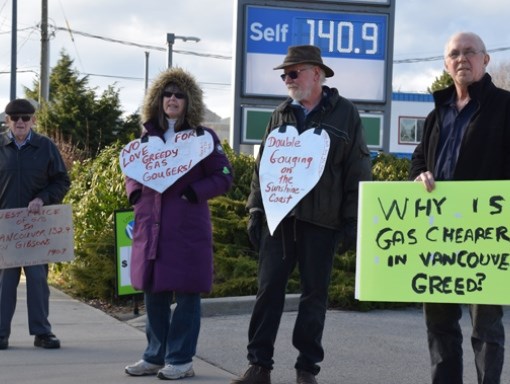The British Columbia Utilities Commission (BCUC) says it will be expanding its fuel price data collection and reporting to include Powell River, Squamish, Port Alberni and Revelstoke on an “ad-hoc basis” in its role as administrator of B.C.’s Fuel Price Transparency Act.
The commission announced June 15 the data will be collected from June 1, 2020 to Sept. 30, 2020 and made publicly available on the BCUC’s GasPricesBC.ca website at regular intervals in response to hearing from “many individuals seeking more specific retail pricing data.”
The BCUC said it chose Powell River, Squamish and the other communities because they were the areas “the BCUC heard about most.”
Gasoline prices have also been a hot topic on the lower Sunshine Coast for months.
“Unfortunately the lower Coast wasn't part of this initial investigation, but I hope that we can extrapolate from what we learn about Powell River,” said Powell River-Sunshine Coast MLA Nicholas Simons, who has advocated for the BCUC to study gas prices in his riding.
The BCUC said it will also collect data from Nanaimo and Langley “for comparative purposes.”
B.C. Energy Minister Bruce Ralston said in a statement that the government “has taken strong action to get to the bottom of unexplained high gasoline prices,” but some communities are still “paying significantly more” than others.
“I’m pleased to see the BCUC is looking into why people in Powell River, Revelstoke, Port Alberni and Squamish are paying more for gasoline, in response to public feedback from these communities. People deserve transparency and fairness when it comes to gasoline prices.”
In an interview with the Squamish Chief newspaper, Ralston declined to say what would happen should the commission find that gas pricing is unfair in the identified communities.
“We’ll have to see what they find. I don’t want to prejudge that,” he said. “But [what] we’re expecting is a thorough investigation by the utilities commission with the tools that they now have.”
Ralston admitted, however, that in past cases where gas prices may have been deemed unfair, authorities have had limited options.
“Well, there hasn’t been the power to do anything,” he said. “Other than just publicity, public shaming and persuasion, but, beyond that, really nothing.”
He noted that the extra attention by itself might lead to some changes.
“Sometimes, people are of the view that simply the act of scrutinizing it, and an anxiety about what the public might think about a finding that would be adverse to their interest, might lead wholesalers and retailers to moderate their prices – we’ll see,” said Ralston.
– With files from Steven Chua/Squamish Chief



